#and not based off a bodhisattva
Text

Kat Kraydel is literally a bigender icon, when you look him/her up he/she's literally listed in both the male AND female categories
#yo kai watch#yokai watch#kat kraydel#hold on im gonna autism a little bit in the tags here#it kind of reminds me of another gender ambiguous figure in buddhism named Kannon#who has been labeled as both male and female in the past (but is mostly regarded as female in Japan)#even though kat kraydel is technically based off the buddha Amida Nyorai of the Jodo Sect#and not based off a bodhisattva#its still kinda neat to me how it parallels Kannon in that way#“are you male or female” “im enlightened”
8 notes
·
View notes
Text
Hey. This is my possibly favorite Noble Phantasm line in FGO.
But you can’t appreciate it if you don’t get the Buddhist reference, so come over here and let’s learn some Buddhism with the sexy nun:
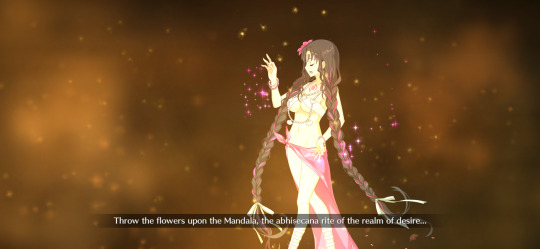

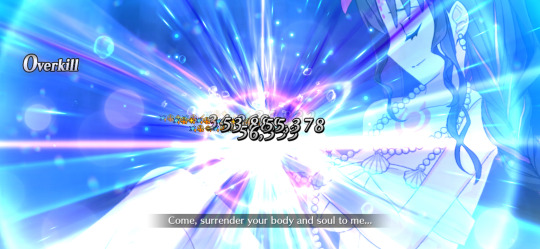

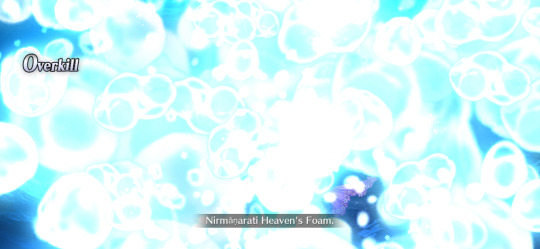
What, you might ask, is an abhisecana (or abhisheka) rite?
As I understand it, it’s an initiation rite for a practitioner who is advancing in their study of the Dharma. In some Buddhist schools, including Shingon—the school from which Tachikawa-ryu, Kiara’s school, branches off (which we don’t know much about, because it’s long-dead IRL and was subject to political book burnings, but that’s another story—this rite involves a student being assigned to a bodhisattva, whose teachings and/or qualities they will study to guide their development and give them direction.
Rather than let a student choose a bodhisattva based on their preconceptions at the time of the ritual, they are blindfolded and cast a flower onto a mandala—like the womb realm mandala, shown below—and whoever it lands on, that’s who they go with.

But Kiara is, as always, encouraging living beings to give up their heavenly aspirations—to cast their flower instead on the mandala of the realm of desire. Let it fall where it may—chase whatever vice or illusion your whims take you to.
But make no mistake.
However it falls, there’s only one bodhisattva that will watch over you as you dance in the palm of her hand.
#it ties in so well to her character arc and other appearances as well#like the running theme of positioning her as a teacher watching over living beings in their pursuit of worldly desires#but making all those connections in one post is a bit much#hopefully the connections will become clear as I make more posts!#rie tanaka’s line beautiful line delivery is soooo good too#as expected#chaldea summer camp brainworms are permanent#kiara lore#fate grand order#fgo#kiara sessyoin#sessyoin kiara#fate series#highly suspect nuns
190 notes
·
View notes
Text
Peng Doesn't Like Farts

Fans of Lego Monkie Kid, as many of you may already know, Peng is based on an ancient monster king appearing in chapters 74 to 77 of Journey to the West (Xiyouji, 西遊記, 1592). In the end of his arc, he is trapped above the Buddha's throne and submits to Buddhism. But you may not know that this very same character appears in a later novel, The Complete Vernacular Biography of Yue Fei (Shuo Yue quanzhuan, 說岳全傳, 1684 CE; a.k.a. The Story of Yue Fei). Peng is exiled from paradise for ... and I'm not joking ... killing a stellar spirit for farting during the Buddha's sermon.
Chapter one of Yue Fei's biography reads:
Let’s talk about the Buddha Tathagata at the Great Thunderclap Monastery in the Western Paradise. One day, he sat on a nine-level lotus throne, and the Four Great Bodhisattvas, the Eight Great Vajra Warriors, the five hundred Arhats, the three thousand Heavenly Kings, nuns and monks, male and female attendants, all of the heavenly sages who protect the Dharma, gathered to listen to his lecture on the Lotus Sutra. His words were like flowers and precious jewels raining from the heavens. But, at that time, a star-spirit, the Maiden Earth Bat, who had been listening to the lecture from beneath the lotus throne, couldn’t bear it any longer and unexpectedly let out a stinky fart.
The Buddha was a great, merciful lord, so he didn’t mind even the slightest bit. But don’t sympathize with the Dharma protector above his head, the “Great Peng, the Golden-Winged King of Illumination,” whose eyes shone with golden light and whose back was a scene of auspiciousness. He became angry when he saw the nasty, filthy Maiden Earth Bat, and so he unfurled both his wings and dropped down to kill the spirit by pecking her on the head. The light-point of her soul shot out of the Great Thunderclap Monastery and went to the Lands of the East (China) in the world below to find a mother and reincarnate. She was reborn as a daughter of the Wang clan. She would later marry the Song Prime minister Qin Hui (1091-1155) and come to cruelly kill the righteous (i.e. Yue Fei) as a means to get revenge against today’s enemy. We will talk about this later.
Let’s return to the Buddha, who saw what happened with his all-seeing eyes and exclaimed, “Good! Good! It turns out that this is an episode of karma (cause and effect).” Then he called the Great Peng bird to come closer and shouted, “You evil creature! You already took refuge in my teachings. How can you not follow the five precepts by daring to commit such a horrible crime? I don’t need you here; you will descend to the mortal world to pay off your (karmic) debt and wait until you have fulfilled your work. Once that is completed, only then will I allow you to return to the mountain to achieve the right fruit (Buddhist merit).” The Great Peng complied with the decree, flying out of the Great Thunderclap Monastery directly to the Lands of the East to be reincarnated. We will stop here (translation by me).
且說西方極樂世界大雷音寺我佛如來,一日端坐九品蓮臺,旁列著四大菩薩、八大金剛、五百羅漢、三千偈諦、比丘尼、比丘僧、優婆夷、優婆塞,共諸天護法聖眾,齊聽講說妙法真經。正說得天花亂墜、寶雨繽紛之際,不期有一位星官,乃是女土蝠,偶在蓮臺之下聽講,一時忍不住,撒出一個臭屁來。我佛原是個大慈大悲之主,毫不在意。不道惱了佛頂上頭一位護法神祗,名為大鵬金翅明王,眼射金光,背呈祥瑞,見那女土蝠污穢不潔,不覺大怒,展開雙翅落下來,望著女土蝠頭上,這一嘴就啄死了。那女土蝠一點靈光射出雷音寺,徑往東土認母投胎,在下界王門為女,後來嫁與秦檜為妻,殘害忠良,以報今日之讎。此是後話,按下不提。
且說佛爺將慧眼一觀,口稱:「善哉,善哉!原來有此一段因果。」即喚大鵬鳥近前,喝道:「你這孽畜!既歸我教,怎不皈依五戒,輒敢如此行兇?我這裡用你不著,今將你降落紅塵,償還冤債,直待功成行滿,方許你歸山,再成正果。」大鵬鳥遵了法旨,飛出雷音寺,徑來東土投胎不表。
#Great Peng#Golden-Winged Peng#Peng#Great Roc#Journey to the West#JTTW#Sun Wukong#Monkey King#Lego Monkie Kid#LMK#Azure Lion#Demon Bull King#Yellow Tusk Elephant#Celestial realm#sworn brothrs#smelly farts#farts
168 notes
·
View notes
Text
LMK S5 trailer, Chinese pantheon infodump, and some ideas
…Man, normally, I feel the urge to write fix-it AUs after rewatching episodes and coming across particularly bizarre theories and takes, not before the new season's even out.
Thanks, S5 trailer.
Consider this your spoiler warning, because the rest of this post will all be my personal opinions about a few major story beats that were revealed + the rough outline for a fix-it AU.
It's also a bit ranty, and features some criticisms of the general narrative, so if that's not your cup of tea, feel free to avoid this one.
Li Jing becoming JE/the regent of the Celestial Realm is just hilariously absurd. I mean, it makes a teeny tiny bit more sense than the "Nezha will be the new JE" fan theory, but that's not a very high bar.
1) In-universe, he had done a grand total of nothing while shit was hitting the fan, and only showed up after it was all over. Which, tbh, isn't too far from his role in FSYY. No, wait, at least in FSYY, he killed Luo Xuan via a pagoda to the head, after the guy had all his fire-based magical treasures neutralized and taken away by Princess Longji.
Yeah, congrats, LMK's Li Jing, you've somehow become even more useless than your FSYY and JTTW counterparts——which is a true feat.
2) Even if someone's making him JE/regent, it wouldn't be the Ten Kings. To put it simply: the Underworld doesn't have that authority. They are the most pathetic of all divine bureaucracies, who pretty much only show up to get pushed around and revive the occasional dead guy in JTTW (and I still love them).
Like, they ain't no Hades or Satan. Just the 10 judges of the Dead People Supreme Court. To heavily paraphrase Di Ting in the original JTTW novel:
"How much power do Underworld gods really have? (幽冥之神,能有多少法力)"
"...Certainly not enough to stop a rampaging demonic macaque who's as strong as SWK, if I say the truth out loud in here and piss him off. Just send them to the Buddha, please."
An analogy: if the Celestial Host is the imperial court, the Underworld is the ministry in charge of judicial processes and prisons. They don't even have authority over the imperial censors who answer directly to the emperor, let alone the power to determine a successor to the throne during a major crisis.
If this was to make the tiniest bit of sense, Li Jing would be the one commanding THEM, not the other way around. Or if it's Bodhisattva Ksitigarbha himself giving orders to Li Jing…for some reason.
But we know that ain't happening bc of the show's strange aversion to showing Buddhist deities on screen, not to mention it would be very OOC for Ksitigarbha, whose job is granting relief and salvation to souls in the Path of Hell, not judging and punishing them like the Ten Kings.
3) If you must make Li Jing the emperor/regent, you have a more mythos-accurate and obvious choice than the Ten Kings, considering you already got the Four Divine Beasts involved!
Yes, I'm talking about their bosses, the humanoid "directional + elemental gods": Lord Father of the East (Wood), Queen Mother of the West (Metal), Emperor Zhenwu of the North (Water).
No South though...because our mythos can't agree on a single directional god of the South, but for shit and giggles, just imagine Zhurong, Yandi, Huaguang, and the Star of Fiery Virtues all sitting on the same narrow bench, staring awkwardly at each other.
Maybe we can have Ziwei, Great Emperor of the Central Sky and North Stars, who is one of the Four Sovereigns(四御) in Daoism (two of which could also be an alternate choice, but maybe a bit too obscure for foreign audiences).
He commands the stellar deities and heavenly bodies——which the Four Divine Beasts would technically fall under, as guardians of the four quadrants of the sky, each in charge of 7 Lunar Mansions.
4) But if you already have these deities, why the hell would any of them make Li Jing the regent? Wouldn't it be more likely for them to create a Celestial Council of Regents themselves, with Devaraja Li Jing under their command as the leader of what's left of the celestial army?
Like, you can still have them, or one of them, going after the gang and ordering Li Jing to put the fillet on SWK.
I can see Zhenwu the Demon-Vanquisher doing that, since the fillet isn't too different from what he did to Huaguang and a lot of the demons he subdued in JTTN: feeding them magical water/fire pills that would corrode/ignite their insides whenever they tried to resist.
(Yeah, compared to that, the fillet would look like the lenient option, since it's just pain and won't actually dissolve/cook you alive from the inside out...)
And it wouldn't be bc he thought SWK was to blame for the Brotherhood's epic fuck-up...somehow. Like, what even is that logic?!
I mean, I can kinda see the Ten Kings doing it as a pre-emptive "Don't blame us for our shitty security, blame that guy over there!" move...except they are no longer answering to any higher authorities who'd hold them responsible at that point!
"What about Li Jing?" You may ask. Yeah, WHAT ABOUT LI JING? Why does Li Jing have to get involved in this?
If he's forcing the Ten Kings to pass judgement on the gang (which surely doesn't look like it in the trailers), why's he enlisting the help of the weakest faction and not, y'know, his celestial soldiers and other gods?
If the Ten Kings get Li Jing to be their enforcer...well, how the Eighteen Hells did they manage that? What could the Ghost Supreme Court and their crappy prison-torture chamber-soul customs office complex even offer Li Jing as a bribe?
And if their goals were to avoid responsibilities by blaming someone else, how stupid did they have to be to actively involve/create a higher authority who can punish them once the cat gets out of the proverbial bag, instead of, I dunno, just stay where they are and keep their head down???
So in my fix-it AU, it's more of a "Better safe than sorry" scenario, where every demon working for the new Celestial Council must prove their loyalty via swallowing the water/fire pill, now that even more dangerous demons have escaped and are running around in the aftermath of S4.
And Great Sage and company are not exempt from that new law either——"If you are truly righteous and Not Like Them and not planning to rebel, what's there to be afraid of?"
Horrified by the Demon-Vanquishing Mansion's 16th century standards of "justice" and "mercy", they naturally would not have any of it, and thus the conflict begins.
Not only would this show the fallout of Azure's misguided rebellion——that, in trying to make a better world, he had made it 120% worse for both humanity and demonkind in less drastic and more realistic ways aside from dooming reality to irreversible destruction, it would also help with the major show-not-tell problem about Celestial cruelty bc the "good guys" in power saw no problem with this kind of shit.
If you want your lawful antagonists who take Order to its extremes, the warrior sovereign in black leading an elite army of demon-hunters + penal legions made of "reformed" demons would be a better choice than the Ghost Supreme Court, don't ya think?
(Fun fact: in Zaju plays, Zhenwu was often said to be the boss of Nezha and Erlang, so him commanding Li Jing wouldn't be too out of place either.)
Now, you may ask, why do I even care? After all, isn't it clear that the show is neither mythos-accurate nor trying to be, considering the JE got K.O.ed by a Bodhisattva's cat of all things?
Not to mention the season's not even out yet, so why jump to conclusions so quickly? Maybe the actual episodes will have explanations that make sense. Relax.
...Cause I don't mind less-than-stellar animations if the story's good, and since I keep noticing the less-than-stellar animations, it clearly isn't good enough.
Also, it's not like it's only the implications that are absurd——my problem is with the whole premise of "Li Jing becoming the new JE/Regent" and "The gang is prosecuted by the Ten Kings for bullshit reasons, even though these guys should not, and never have the power to enforce anything over SWK."
I don't like calling narrative choices "wrong" per se, and prefer to see it on a gradient of "least to most narrative potential". When it comes to adaptations, if the option that is faithful to the original work will result in a less interesting story, then I'll happily take the one that isn't as faithful and takes creative liberties, but makes a better story.
And here, I feel like being faithful to the Chinese mythos inspirations will add to the narrative potential instead of subtract from it, and the idea they come up with kinda...goes against how Chinese pantheons work, in a very simplified and "westernized" manner.
Mostly bc I am a Chinese Underworld mythos lover and think they deserve better than being ominous Hades/Grim Reaper knockoffs. And out of all the possible Chinese gods, Nezha's asshole dad is the least qualified or interesting candidate to fill in the power vaccum left by JE's death.
#lego monkie kid#lego monkie kid s5#lmk s5#lmk s5 spoilers#monkie kid spoilers#fix it au#chinese mythology#li jing#lmk li jing#journey to the west#investiture of the gods#lmk critical#lmk season 5#chinese underworld#chinese gods
36 notes
·
View notes
Text
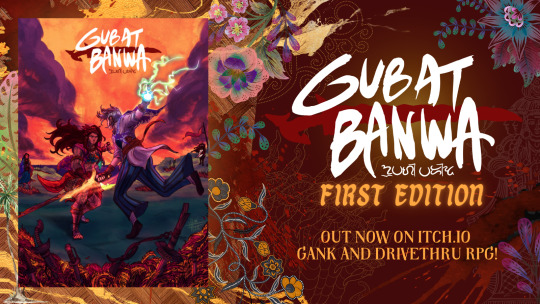
“Violence for violence’s sake is not the rule of beasts but the nature of divinity.”
Gubat Banwa is a game of rapid kinetic martial arts, violent sorcery, heartrending convictions and bouts of will. Warriors that channel gods face sorcerers that master black arts, martial artists who have unlocked a new form of cultivation clash swords with those that perfect the night alchemies.
When the crocodile’s teeth are cast, convictions are unsheathed, and steel sparks: the Umalagad must declare that: “The river of life ever flows! Rejoice in the glory of combat!” and they enter violence
SWORD AND ENLIGHTENMENT. LOVE AND GLORY. VIOLENCE AND LIBERATION.

Gubat Banwa is a Southeast Asian fantasy martial arts Role-Playing Game, inspired by the refulgent cultures of Southeast Asia. Raise your spears, KADUNGGANAN, you elite warrior-braves and asura-knights who travel The Sword Isles to prove their conviction and dictate the fate of the world. Revel in larger-than-life war drama like in Asian Dramas, ballistic tactical martial arts grid gameplay in the vein of Lancer or Final Fantasy Tactics, and find glory beyond heaven. Wield the Thunderbolt of Liberation! Rejoice! In the Glory of Combat!
Itch.io: https://makapatag.itch.io/gubat-banwa
DrivethruRPG: https://www.drivethrurpg.com/.../Gubat-Banwa-1e-Playtest
Gank: https://ganknow.com/services/18713-makapatag-gubat-banwa-1e

Included are!
A unique Southeast Asian-inspired Fantasy setting, with an emphasis on martial arts as a background for war drama and violence, from a Philippine-centric view. Garudas fight against unglu. Martial artist warriors master the Principle of Cutting by meditating upon the teachings of the Violent Bodhisattva. Rituals and superstitions must be performed or else risk the wrath of the ancestors. Vast kingdoms arise with God-Kings at their helm, claiming to be Shiva-Buddha incarnate. You and your warband stand at the center of this violent mandala!
A corresponding narrative system made to help play out war drama in this setting, along the veins of Final Fantasy Tactics, Hero, House of Flying Daggers, Malazan, Tigana, Game of Thrones, and Tactics Ogre!
Want to try out the Thundering Tactics Battle System that fuses modern narrative sensibilities with D&D4e style tactical combat and wargaming dice pools. The Turn Order is known as the Rhythm, and you don't activate a unit; you fulminate a fighter. The game heavily relies on terrain abilities and emphasizes movement, especially with it's 3-Beat System, which lets you do 3 Actions per turn (some actions might cost more than 1 Beat!)
A Discipline System inspired by Final Fantasy Tactics Jobs, Digital Devil Saga's Mantras, and Shin Megami Tensei Nocturne's Magatama. Mix and match your Techniques! Change Disciplines with a single Downtime Action! Be a Death Dancer that heals with alchemies, or a Tigpana (Spiritual Archer) that rides upon a crocodile!
A narrative system wherein describing or doing dangerous and cool things is encouraged, as that is how you get Thunderbolt Tokens, which let you dictate your fate. This same narrative system prioritizes 5 Approaches instead of Abilities, in the vein of L5R, with each approach based off of the 5 Elements of Gubat Banwa's natural philosophies and esoteric tradition.
Said narrative system comes with a baked in Honor system that interplays with Debt, which is how you get others to do things for you. And NPCs can accrue this same debt, forcing you to follow them. If your Honor ever falls below 0, you must play a new Kadungganan!
An enemy system that allows for Solo and GM-less play! Roll an Enemy's Gambit Dice to find out what actions they do when they Fulminate. Adapt and act accordingly, make for dynamic fights!
Event tables and generators for every possible thing you might encounter while journeying in the Sword Isles, to fully immerse and play in its cultures! As well as Lore to fulfill any questions you might have.
Finally, baked in is the starter adventure: The Sword Devil. So you can jumpstart your games!
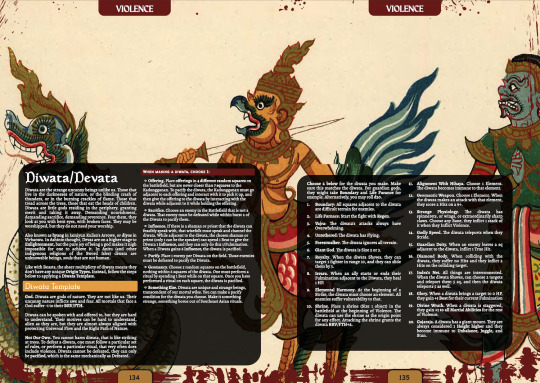
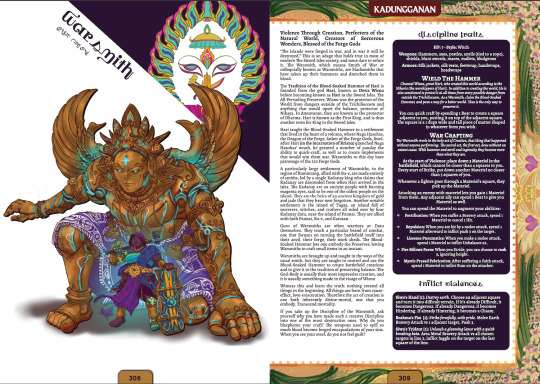
#gubat banwa#ttrpg#southeast asian#fantasy#philippine#filipino#tactics#rpg#gamedev#d&d#dnd#tabletop#board games#skirmish#wargame#martial arts
245 notes
·
View notes
Note
Random question, because I thought of other jttw/sun wukong media with characters ya don't see cross over to new works, are there any of those lil fellas, ladies or others that ya want to bring to your lmk one since it is your au and you can dictate of say a certain jade rabbit and bodhisattva have a weirdly friendly relationship while in the books they would have been more butting heads?
I'm not trying to direct anything just figured I would use those two dynamic in 2010's "The Monkey King" instead of trying to push some six eared macaque stuff since we know how ya feel on his character in ya au.
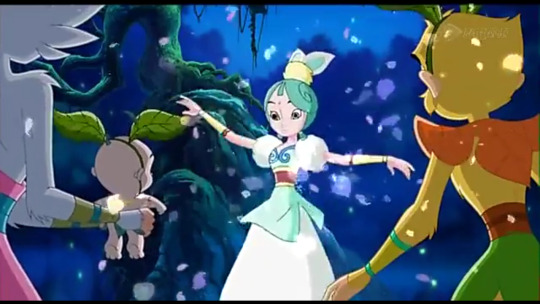
Like far more media on the table for ya to pick from but just curious in general if we may see some characters that are possibly based off designs from each media or if maybe just add a character that only showed up in one of the other jttw adaptations besides of course lego and the jttw novel since those are main staples in your au and all.
(Sorry if confusing just figured I would ask ahead of time instead of being that random "who's that" ask box peep when I see someone new that isn't exactly an oc but also not from either main parts of the au)
i get what you mean but i'm not quite sure tbh! smth like that might crop up eventually as i delve further into the story and worldbuilding, but i do want to keep to JTTW as closely as i can. anything that goes outside of it will mostly be set on the AU's present time and i'll do my best to offer proper context for them when i introduce them!
i miiiight do some references to FSYY but i'm not sure i'll go too deep into it cus it IS a different story with not much connection with JTTW besides general Chinese folk religion characters and deified historical figures.
i do enjoy the concept of Ao Bing and Nezha becoming friends post-FSYY, for instance, so i might explore that later on!
23 notes
·
View notes
Note
Since ZUN loves to add mythological Chinese characters along with Japanese ones, do you think he will add Xi Wangmu or Seiōbō in future Touhou?
"Loves" is a bit of a strong word - the number is growing but it's not all that rapid. There's what, five of them? Seiga (a purely literary character in her case, not a mythical one), Junko, Yachie, Yuuma and Biten (tbh going all out on the saurgami part would be more unique and give her more versatility but i disgress) are the only actual examples of characters like that off the top of my head, Chang'e and Junko's family are non-entities. Keine doesn't really talk about the Yellow Emperor or the birth of a bodhisattva so she's pretty firmly based on the Japanese reception alone. Yoshika is Miyako no Yoshika in name only (bit of a waste, very funny guy and "strongest madman under heaven" is a Touhou-compatible epithet) so I guess you can add her, though. Meiling doesn't count imo, "vintage Chinese stereotype" isn't a type of Chinese mythical creature.
There isn't really any distinctly Japanese tradition pertaining to Xi Wangmu, also (though she does appear in art and at least one onmyodo ritual, see here), so you are asking about the same figure twice. That aside, I feel like she's too big of a name for Touhou tbh. Next to Nuwa she's probably THE Chinese goddess in popular imagination. If I understand correctly what little I've seen of the recent interview, Zanmu was inspired by Ikkyu but demonstrably isn't actually named after him but a vaguely related lesser known monk, so I think specific figures being too mainstream remains an issue for ZUN? But then we got a Wukong impersonator and I think Wukong is easily in the top 10 of most mainstream mythical figures in the world so you may never know.
Personally I think Pangu or Shennong would be interesting picks as far as major Chinese figures go since they had fairly unique reception in Japan. For details see Faure's Pan Gu and his Descendents: Chinese Cosmology in Medieval Japan.
17 notes
·
View notes
Text
Kenjaku's Past Headcanons

I have a lot of theories mixed with headcanons on Kenjaku and his past, so I wanted to compile them into an actual post.
Just for fun! They're mostly headcanons, but some of them stem from theories I have based on things like information from the story and history ♡

Kenjaku was born to the Fujiwara Clan, the oldest and most powerful Clan during the Heian Era. They were known for their manipulative dealings and revered Fukukenjaku Kannon.
He had a Heavenly Pact similar to Mechamaru, in that he was gifted with excess amounts of Cursed Energy but was physically frail as a side-effect
He was born early, and the midwives thought he was dead. His excess Cursed Energy altered his physical appearance, so he came out with skin as pale and as cold as a corpse and with eyes as white as milk.
The clan saw his unusual appearance as a Curse, but his parents adored him. They named him Kenjaku because they wanted him to have the traits of the Bodhisattva, such as mercy and compassion.
Due to his Heavenly Pact, Kenjaku was a frail boy. He was sickly, causing his parents to coddle him.
Kenjaku had a good, albeit complicated relationship with his parents. They adored him and did their best to be good parents to him, but they still hurt him.
Their tendency to fret over him constantly was incredibly frustrating to Kenjaku. They would condescend to him about what he could and could not do due to his body.
He loved them, but they held too tightly to him and never let him prove himself.
Because of his unusual appearance and his frail physique, Kenjaku didn't have a lot of friends growing up. He couldn't go out and play very often because he would get tired, and his appearance scared the other children.
The other parents on the Estate had a tendency to gossip and tell their own children to steer clear of him, telling them he was cursed.
He tended to latch on really hard to the few people who did give him the time of day. He would talk their ear off given the chance.
To entertain himself, he would read or daydream. He'd play strategy board games with his parents or make-believe games like house.
His skin was so unnaturally pale he'd often have to carry a Wagasa to shield him from the sun, lest he burn terribly.
Kenjaku was weak, but his one saving grace was Jujutsu and his mind. He was, by all-accounts, a prodigy.
He was allowed to train under Tengen because of his talents. His parents either requested Tengen to teach him or Tengen sought Kenjaku out herself.
Kenjaku quickly became Tengen's top student. He was young when he started training under her, around 10 or 13. They had an almost mother/child relationship.
Tengen helped him discover his Cursed Technique. I imagine he was very conflicted when he learned what it was and how to use it. Tengen helped him overcome those hurdles.
As Kenjaku aged and the more he trained and pushed himself, especially in an environment where his parents weren't there to coddle him, he developed better endurance.
He still wasn't quite as physically strong as his peers, but he made up for it in intellect and physical Technique.
He was still a bit of an outcast. With age came confidence, and he had a tendency to be full of himself. He was Tengen's prized pupil, after all, and his application of Jujutsu was second to none.
He had been so shy and timid as a child, so his teen and young adult years were really where he decided he wasn't going to be a doormat anymore.
All of that time he wasn't allowed to do much of anything, he made up for it by showing off as much as he could.
And he annoyed his peers often, albeit it wasn't always his intention. Having so few friends as a child made him a little excitable when he actually had the opportunity to rattle about his interests and show off his knowledge.
This was especially true if he happened to have a crush on someone. He had no experience courting, so he would just be extra annoying to get their attention.
The older he became, the more his relationship with Tengen developed. It became more of a mutual friendship.
Kenjaku was ambitious, and yet every idea he shared with Tengen was deemed too reckless. Tengen would chastise him for what she saw as childish ideas that were more dream than reality, while Kenjaku would criticize her for being too conservative and unwilling to explore change.
This caused a lot of friction in their relationship, especially because Kenjaku felt he was being treated like a child again - being condescended to about what he could or could not achieve
Tengen's behavior reminded him a lot of his parents' and it frustrated him to not be taken seriously yet again.
This all eventually led to the fracture in their relationship. Kenjaku left after a big argument with Tengen, and things were never the same after that.
He was only around 17 - 22 when he left to explore his own ideals and make his own path.

15 notes
·
View notes
Text
Continuing off of my first introduction of my LMK/JTTW oc, I realize that I should give her a second introduction expanding on her character as well as a summary of a story concept I had in mind. It still won't leave my head. Forgive me as I tend to ramble a lot.
Inspired by @skittlescripts and @theweepingegg,
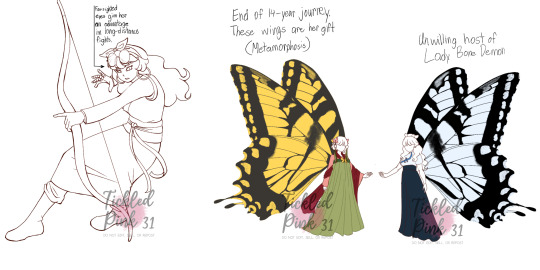
(Omg, I just noticed that I forgot to draw her freckles)
I changed her robes because I ended not liking the silhouette of the first one. And I gave her a butterfly brooch too instead of a pendant
She goes by many names depending on who is addressing her. She’s born as Marisol Orozco-Leong, although her obsession with butterflies earned her the affectionate nickname, Mariposa, by her relatives. Historians refer to her as the Butterfly Lady, Queen of Butterflies, or Butterfly Maiden… or just Sun Wukong’s wife.
Guanyin gave her the name Liang Xiaodie after she rescued and revived her. We’ll get to that in a bit.
Her farsightedness being used as an advantage in long ranges was an idea I got from Black Butler who has the gunslinging Mey-Rin, a maid who can see from miles away.
By the end of the journey she was rewarded with a pair of functional butterfly wings to symbolize her growth in character, or more so her metamorphosis.
Her wings are based off of the Asian Swallowtail. During her time as an unwilling host to Lady Bone Demon, her wings closely resemble that of a zebra swallowtail or a tree nymph butterfly
(Yes, you read that right: LBD chose her instead of the little girl. You know, to hit Wukong where it hurts.)
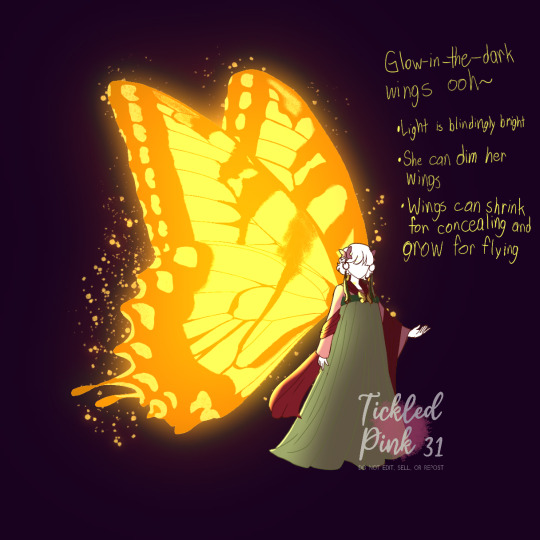
I’ve been researching a lot on butterflies in Chinese culture, and I hope my resources are correct. If not, please correct me:
One thing that often comes up is that butterflies denote romantic love. There’s also the Chinese folktale of Romeo and Juliet, “The Butterfly Lovers” (this loosely alludes to Wukong and Xiaodie’s relationship)
They can even signify longevity, rebirth, and good fortune
There were also a few articles that say there are legends that depict the Bodhisattva Guanyin as a butterfly.
Here are just some illustrations of Mariposa/Xiaodie. The goal was to depict her change throughout the journey, being sent back to her time right after, and her plan to reunite with Wukong going awry when LBD interferes.

Now, for the plot. Watch me ramble even more.
The whole concept is pretty much a time loop that circles back to LMK’s modern era, and Mari experiencing the 14-year journey that was actually condensed within her 2-week coma. That's the most coherent way I could word the situation.
In an ironic twist, Mariposa is not much of a social butterfly and is more of a shrinking violet, a cocooned caterpillar if you will.
Being born and raised in Singapore and her mother having Han Chinese ancestry, Mari and her siblings all grew up on the stories of Journey to the West.
Given the fact that demons roam around freely among humans, I like to think that the events of JTTW are treated like actual historical events in LMK and not just a legend.
Now, here’s where the time loop begins:
What kicks everything off was a college program that Mari joins where students get to spend learning for a semester at sea and travelling the world
By the end of the semester, however, the ship gets caught in the storm and Mari drowns in the event.
I don’t want to explain how she got sent back to the Tang Dynasty. I mostly just want to keep that ambiguous.
While Guanyin and her disciple are out looking for the scripture pilgrim, they came across a girl who was half-dead and washed up on a shore. They revive her and nurse her back to health and find out that she has no memories.
How she got the name Liang Xiaodie, Guanyin found her surname (or one of them), Leong or 梁, stitched into her bag, but to the Bodhisattva, it read to her as Liang. (It's Mari's mother's surname. Leong is the Singaporean transliteration of Liang)
Xiaodie was chosen as her given name for her butterfly brooch and the several butterfly embroideries on her clothes.
Xiaodie slowly begins to regain her memories, mostly for basic things on surviving in the wilderness and gaining muscle memory on how to use her bow and arrows again like a master, but not enough to remember her real name or her life before.
Like with the other Pilgrims, Guanyin suggests that Xiaodie should join the scripture pilgrim. Before Guanyin leaves, she gives Xiaodie's bow the ability to summon arrows of her own will so that she may never run out of ammo.
She ends up meeting Tripitaka and Sun Wukong a little bit before Ao Lie is introduced.
Xiaodie is a bit of an odd addition to the group mostly because of her amnesia. The rest of the disciples were sent on this journey to gain redemption and enlightenment. Xiaodie doesn't have a story about her past sins as far as she knew. She went on this journey because she didn't know what else to do. She's the only other mortal of the pilgrimage and the sole woman to boot.
Xiaodie did not physically age at all during the journey. At first, she believed that it was because of the manfruit from the Ginseng Tree that Wukong fed her, but it was actually because her actual physical body was in her time healing in a hospital. Each year that passed by during the journey, only a day passes by in the modern era.
That isn't to say that the manfruit didn't affect her. Her lifespan was still extended even after waking up
Her memories came back at a snail's pace. She has dreams of being in a hospital bed and people watching over (her parents and the doctors).
In spite of her amnesia though, Xiaodie was seen as the brains of the group. Bits of amnesiac resonance come to her that are often useful when it comes to survival, such as knowing how to filter water of bacteria to drink, making soap or shampoos for hygiene, and even remembering bits of Journey to the West whenever she gets a bad feeling about their environment that they're in.
Another thing about her amnesia is how much her dialect differs from everyone else.
As Marisol/Mariposa, Xiaodie grew up speaking and writing Singaporean Mandarin and Modern Mainland Mandarin while everyone else around her uses Middle Chinese. So, it's a bit of a struggle for Xiaodie to communicate with others properly and vice versa.
On top of that, Xiaodie was not aware that she was sent centuries back for the longest time. She doesn't get why her companions don't know what cars or airplanes are or why they don't understand the slang she uses
It wasn't until near the end of the journey did she regain all of her memories and finally understands her time travel situation. It ended making her more reluctant to stay in the past much to Wukong's dismay.
At the end of the journey, Xiaodie and Wukong planned to get married, but with Xiaodie's reluctance and homesickness lingering, a swarm of butterflies takes her away, and she disappears in front of the pilgrims' eyes.
Wukong, devastated, was quickly informed that Xiaodie did not belong to this century, and had to be sent back to her family. The best thing Wukong could do for now is wait for her correct era to come around, which will roughly be 1400 years give or take.
Back in the modern era, Mari wakes up from her coma thinking everything was just a dream, but something feels off...
Everything she felt—the pain, the joys, and the experiences she went through felt real. She feels as if she actually hadn't spoken to her family in 14 years, and she feels like an older person stuck in a younger body.
Most of all, she feels as if she's lost something, or someone.
It wasn't until the butterfly wings appeared on her back that gave her the confirmation that she really did go on the journey for the scriptures and that her feelings for Wukong were indeed real
So, off we go. Mari makes a plan to go to China and find Wukong herself, and she lands herself in the coastal city of Megapolis. There she finds out that the Monkey King has a successor.
However, life sure loves to throw a wrench in her plans when the Lady Bone Demon escapes her prison and takes Mari's body as a host
She was the perfect host. How could the Monkey King ever want to hurt someone he's waited for so long?
Will Sun Wukong go through with the pain of possibly losing his beloved? Will the Mari find a way to break free of her possession? Find out next time on whatever shit I post next.
#my art#my writing#journey to the west#jttw#lego monkie kid#lmk#lego monkie kid oc#journey to the west oc#oc: marisol orozco leong#oc: mariposa#oc: liang xiaodie#sun wukong x oc#monkey king x oc#sun wukong#monkey king
48 notes
·
View notes
Text
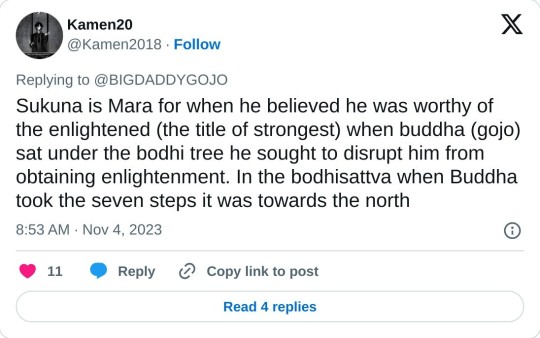
sukuna and gojo mara to buddha
Sukuna is Mara for when he believed he was worthy of the enlightened (the title of strongest) when buddha (gojo) sat under the bodhi tree he sought to disrupt him from obtaining enlightenment. In the bodhisattva when Buddha took the seven steps it was towards the north
Now when Buddha defeated mara he was an old man and died of old age (gojo refers to this) but, this is when sidatharra obtained enlightenment and became reborn as Buddha.
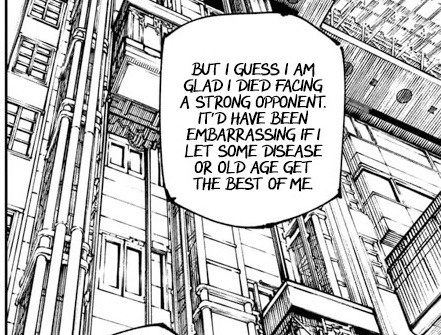
But, for gojo his 7 steps were the 7 people that effected his life (as we see they're in order of who came into his life from first too last in his road too enlightenment) and he heads north to obtain his enlightenment aka the bodhi tree.
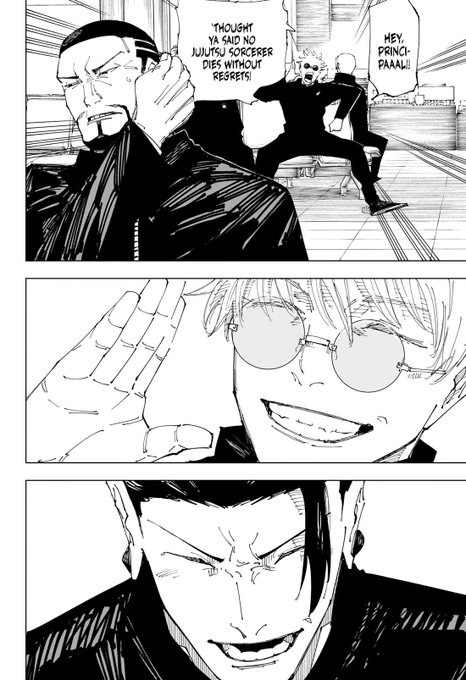
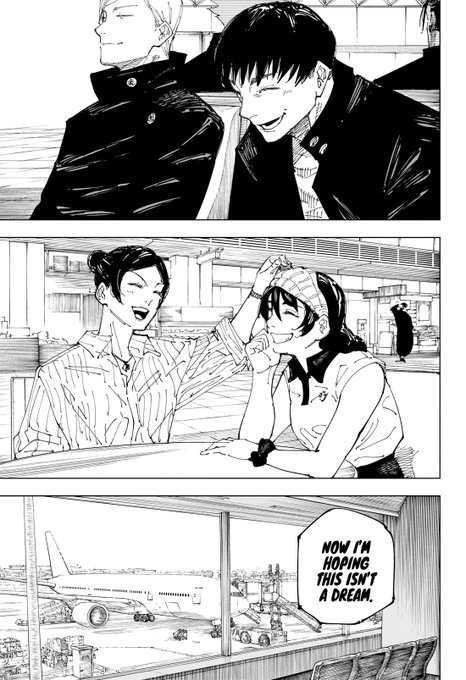
Gojo is based of Siddhartha (Buddha) who at the age of 29 (gojo is 29 due to being trapped in the box missing his bday) walked out of the palace for the 1st time (losing the title of strongest) to see the 4 sights 1st the old man
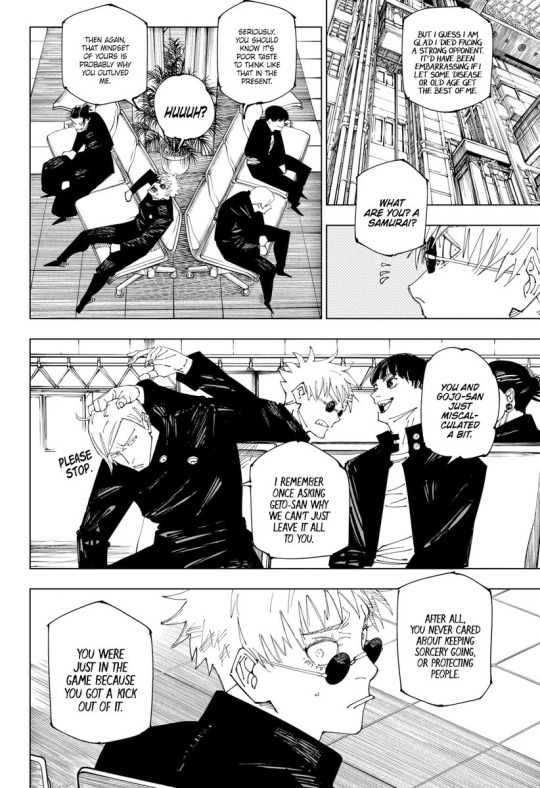
The 3rd sight was a dead body which taught Buddha that "death is an inevitable fate that befalls everyone" this was haibara who's death showed gojo how wrong the sorcerer society is.
Who told Buddha "aging was something that happened to all beings alike".

The 4th sight was a wandering priest, who Buddha met after seeing all 3 sights, who devoted himself to understanding human suffering. This was geto in trying to rid humanity as he believed this was the way to ending human suffering.
In learning of this Buddha goes off to find enlightenment (gojo leaves to find enlightenment).
The 2nd sight was a diseased man who explained that "all beings are subject to disease and pain" in which I believed it was geto but, its actually toji. He was the first to show that gojo was the same as him a man that can die and feel pain.
The 3rd sight was a dead body which taught Buddha that "death is an inevitable fate that befalls everyone" this was haibara who's death showed gojo how wrong the sorcerer society is.
The 4th sight was a wandering priest, who Buddha met after seeing all 3 sights, who devoted himself to understanding human suffering. This was geto in trying to rid humanity as he believed this was the way to ending human suffering.
7 notes
·
View notes
Text

These are my base character notes on Kenjaku. I encourage muns who interact with my Kenjaku muse to read the tl/dr section of this post, so we can be on the same page about how I intend to portray this character. This post would get incredibly long if I included every canon reference that I've built off of so I've only put some of them under the cut. My Domain Expansion takes and the Historical Timeline of Kenjaku's life will be fleshed out in a different post. I also am not mentioning anything about the Itadori or Kamo families here as this is just meant to be an overview of the character to aid in interactions. Thank you for reading ! ♥
TRIGGER WARNINGS: religion, gore, mentions of pregnancy
tl/dr ; Kenjaku ( 羂索 meaning 'Compassion' & 'Salvation' ) is a curse user with the innate ability to take over another's body, including the vessel's memories and cursed technique. This technique is largely known as 'body-hopping', however in essence, Kenjaku is a 'soul-eater'. Kenjaku's enlightenment pertains to the awareness of their own soul, which combines the physical ( flesh body ) & immaterial ( cursed energy ) and subsequent application of that awareness through jujutsu.
Even though Kenjaku appears to be more of an entity due to their anciency, they did use to be a person at one point. However, they have lost most of their personality traits while living all those different lives, latching onto their obsession with cursed energy as it gradually became their sole defining trait. Even though they present as a skeptic, nihilistic atheist, Kenjaku is agnostic in essence — as they do acknowledge the presence of things beyond their understanding ( the pure form of cursed energy is almost revered as a deity by them ) However, they have come to view the world of curses as less of a religiously spiritual thing and more as a pragmatic, palpable field that lends itself to experimentation.
Kenjaku can be described as an onmyoji, a seer, a scientist or a priest; but what sits at the core of their character is the same curiosity that has led humanity through its various evolutionary stages. Throughout the ages they have become a zealot to this impossible idea of optimizing cursed energy, so their motivations are no longer egotistical but rather verge on self-sacrificial as long as their will is carried on.
And the enlightened person is the same to all beings, differing in his attitude only in so far as all beings are different. He has the same sentiments for the high as for the low, for the wise as for the ignorant, for the noble-minded as for the immoral.
— Buddha speaks about essence.
UNDER THE CUT:
Important headcanons
Brief Backstory Overview
Character skeleton
IMPORTANT HEADCANONS
Kenjaku can't truly be killed unless every physical part of their body is destroyed with cursed energy. Kenjaku's original body is preserved within the statue of Fukukenjaku Kannon in Nara. They posed as said bodhisattva for a time. It is a lacquer statue that functions as a sarcophagus. Because of the special grave wax used as a barrier to contain its residuals, no one except for Tengen would be aware of that fact.
They were not born with multiple limbs, but they were able to manifest them using soul amplification techniques. At one point, Kenjaku possessed several arms and three pupils in each eye that moved individually from each other. In their first life, they were originally female at birth. Kenjaku's original eye color is a deep blue that can later be traced in both the Zenin and Gojo bloodline. Their natural hair color is an inky black in contrast to pale skin that was heavily covered in ritual ink. Originally, the upper part of their head was shaved, meaning they were half-bald and the top of their head was marked with the same sigil appearing later on Culling Games' players — that being Kenjaku's signature seal.
Their brain has teeth because they use it to consume the one of the vessel they inhabit. By eating the brain, they consume the host's memories, cursed technique etc. In that way, Kenjaku literally steals the lives of those they inhabit, adding them to their own. ( By extension, a soul that is strong enough to withstand this procedure may continue to manifest while Kenjaku is in control of the body. Suguru Geto's reflexive reaction in Shibuya was the first time this has happened, however. )
Kenjaku's pact with Sukuna entailed showing Sukuna their own technique for transferring their soul into a cursed object. Since Sukuna could learn something by simply watching it, he would then be able to do the same in order to split himself into his fingers. The terms of this binding vow are only known between the two sorcerers. Other than the King of Curses, however, they are the only sorcerer with this ability.
Kenjaku is known by different names both across Japan and the west. The only reason why they never ventured outside their homeland was that Japan is the cursed energy pillar of the world, so there was no point for them to leave. Their technique enables them to speak any languages the vessel could speak prior.
During their many lives, Kenjaku has sired/birthed several children as part of their experimentations. Their cursed energy can be found in different sorcerer clan bloodlines as well.
Kenjaku's trademark symbols include the Thousand Year Crane bird and the Never Empty Lasso, which the avatar of Kannon, Fukukenjaku, uses to 'rope in' the people with her compassion. Their presence is so interwoven with religion in Japan that these symbols have acquired cultural significance. There are still cults worshipping them in Nara to this day.
BRIEF BACKSTORY OVERVIEW
During the Nara period, Kenjaku served as an acolyte to Tengen, who was spreading Buddhism in Japan at the time. Tengen was revered as a deity in both the sorcerer and non-sorcerer world. Through her sermons pertaining to self awareness, enlightement and The Soul, Tengen inadvertedly planted the seed for what would later become Kenjaku's obsession with cursed energy. Soon their pursuit of knowledge would bring them on par with the Goddess herself, which led to a rift in their blossoming friendship when Kenjaku's pursuits clashed with Tengen's conservative ways. Tengen became all the more reclusive while Kenjaku started experimenting with cursed energy through the forbidden art of kodoku.
From the point of that fall out and onward, Kenjaku's obsession started to take over every aspect of their life, driving them to detachment and callousness. After perfecting their body-hop technique, they begun experimenting with the sorcerers of their time, often posing as a healer or a consultant to garner information from them. Kenjaku was a prominent figure in the Heian era because of their vast knowledge of jujutsu.
Among other things, Kenjaku lived as a bodhisattva representing the compassionate deity of Kannon for some time, which has been the defining point of their own legend, in the same way Sukuna earned his back then. During this period they would perform 'miracles' for the faithful of their temples, while covertly they had begun their experimentations to understand how cursed energy interacted with humans, later on leading to the Death Painting experiments.
CHARACTER POINTS / SKELETON :
JUJUTSU KAISEN ( 呪術 廻戦 ) — the character 'kai' ( 廻 ) meaning 'revolve'/'go around' represents the theme of eternal cycles that is prevalent in the series. The Ten Shadows Technique, The Six Eyes, The Star Plasma Vessel; all cycles that continue to perpetuate so long as conditions are met. In the JJK world, the cycle is an expression of balance.
Kenjaku, a sorcerer with a technique that immitates reincarnation, forcefully grafts themself into these cycles, thus disrupting said balance.
Sukuna, Kenjaku, Tengen: three characters who have achieved conditional immortality, each through a different means. Tengen, with the innate ability to be immortal yet corruptible, Kenjaku with a technique that would allow them to reincarnate and Sukuna with a method to preserve himself forever. The backstory here would be that Tengen was the one to be born with her immortality, whereas the other two had to achieve it. In Kenjaku's case, to discover the true potential of their technique needed to 'abstain from the physical'/leave their original body behind. Tengen and Sukuna are inherently 'in tune' with the nature of jujutsu, Tengen because she was born with the immortality technique and Sukuna because he seems to have possessed a unique talent for understanding jujutsu, apart from his power-hungry nature. The comparison between these three characters is meant to highlight the fact that, out of the three, Kenjaku is the one whose 'enlightenment' came through venturing into the study of cursed energy.
Tsukumo Yuki, the mirror: Kenjaku's 'mirror' is Yuki, as both their characters revolve around answering the question of what is mankind's next step in evolution. Yuki is the only person towards whom Kenjaku shows a personal dislike, as she has 'went through the same journey' / 'asked the same question ' as they once did, however she has reached a completely opposite conclusion, wanting to break away from cursed energy completely. This goes against everything Kenjaku believes; however they do express that they were content to find out she thinks the same way as they do.
Kenjaku's references to religion and prayer: In the fight against Takaba, Kenjaku has a random intrusive thought where they marvel upon Takaba's perfected prayer stance, saying they had not achieved such a symmetrical and deep stance until late into their twenties. This confirms that Kenjaku was practicing religion during their first life. Tengen being the one who helped spread Buddhism in Japan during the Nara period, it is very likely that Kenjaku was one of her acolytes.
Control & the fight with Takaba: Because of their long life experience and accumulated power, Kenjaku is a character that's always in control of the world around them. That came as a side effect of their obsession, originally. Going back to Buddhist philosophy, it is surrendering this need for control over all aspects in life and accepting the 'lull of the waves' in the sea of samsara that brings one to a state of peace. Kenjaku expresses this covert intuition both outwardly ( I need to create chaos that is beyond my control ) and inwardly during the fight with Fumihiko Takaba. When the fight begins, Kenjaku's instinct is to try and get control of the situation by dismantling his technique and focusing on staying composed. When they realize that there is no emotional manipulation aspect on Takaba's end, however, they begin to surrender that control and indulge a sense of playfulness and curiosity that's almost childlike, revealing a more human aspect to their character. In the end, Kenjaku admits that they are glad they did the Culling Game for no reason other than having genuinely found this carefree sense of connection and joy after bonding over their shared love for comedy.
( I will probably add more to this in the future or as I re-read the manga, but for now this was getting incredibly long so I'm stopping here xD thanks for reading! ♥ )
5 notes
·
View notes
Note
THEY DO LOOK SIMILAR. And like, I don't like Tripitaka based off what I heard about him in the book BUT he's probably way better compared to LBD so all in all, you can get some juicy parallel art of SWK and Macky with their "Masters" and their personal "chains"
now i haven’t finished the book but Tripitaka is way, way, way less worse than LBD. he’s a human monk (the golden boy of monkness as the prophecy foretold) tasked to be (basically) a divine delivery boy to pick up some sacred scrolls. his journey is fraught with monsters and demons and bandits and he is a uber, gullible pacifist
imagine you were tasked as a divine delivery boy but your journey was terrifying af, had to keep to your vows and practices while not getting killed in the process.
fucking terrifying, right?
THEN!! to help ease your journey, you’re informed (by both a bodhisattva and a demon monkey) that you will be aided on the journey and then said aid laughs in your face when you hold up your end of the deal then dips
now you are back to square one (i would cry tbh). BUT!!!! that same Bodhisattva comes back and hands you means to guarantee the deal is made because you are putting your hands into the hands of a demon. and not just any regular scary demon
lbd on the other hand took clear advantage of Macky’s desperation and weakness. she abused her end of the deal to its core (and yet Macky tried to squirrel away which made his situation worse but that still doesn’t make her actions ok)
Tripitaka’s was one brought from necessity. did he abuse it? yeah but never out of malice which is a key difference. he was very out of his element
#forgive me anon i am a tripitaka apologist#is he perfect? absolutely not this guy is so fucking oblivious that some times i wanna pull my hair out#i have been reading this book in increments so excuse me if i get the exact details wrong#lmk#asks
5 notes
·
View notes
Text
I have some questions about "manifestations" as a concept in Hinduism and Buddhism (and whatever else).
In Buddhist temples, it's very common to have "Niō" or whatever you want to call the big scary guys on either side of the entrance gate. E.g., these guys in Osaka's Tennōji:
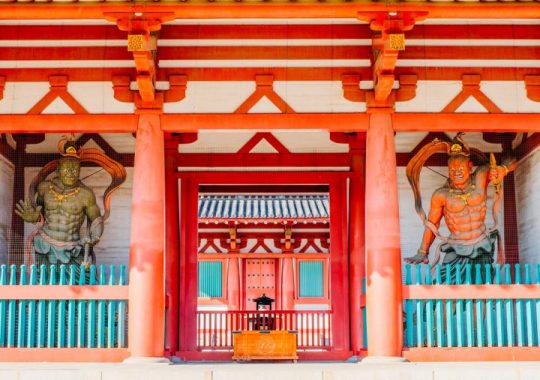
I learned from my wife that one of them always has an open mouth and the other always has a closed mouth, and it's collectively supposed to represent "Om". It's also supposed to be an alpha-and-omega type thing--Wikipedia says they're the first and last letters in Devanagari (and coincidentally the first and last ones in the modern Hiragana chart?).
Anyhow, I was trying to guess which one of them is syncretically related to Hercules. I guessed the guy on the right, but it turns out the answer is both. "Both Guhyapāda and Nārāyaṇa are seen as manifestations of Vajrapāni [the bodhisattva whose depiction is based on Hercules]"
What does that mean? I always assumed that statements about manifestations or avatars or whatever were supposed to be interpreted as happening at different times. Was this just a one-off thing, or are there other contemporaneous avatars of the same god or whatever?
31 notes
·
View notes
Text
Fate Fanservant: Yù Tù, the Jade Rabbit(Foreigner)
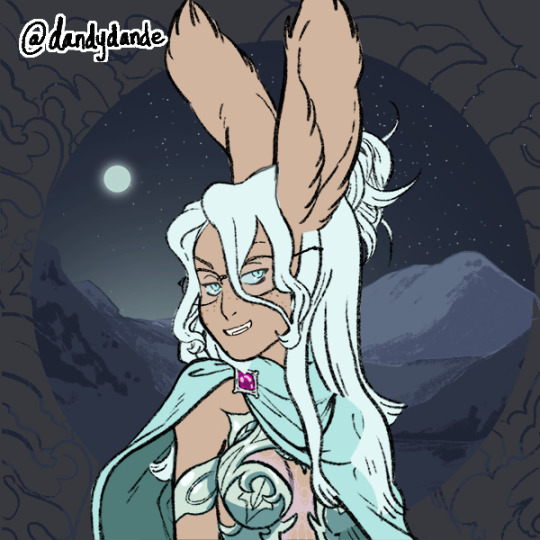
Picrew Source: https://picrew.me/image_maker/565251
Ascension Stages:
First Stage: Just a cloak and some 'armor' covering her body. Ritsuka suspects this may simply because she didn't really care and just tossed on whatever she could find.
Second Stage: Dressed in a mix of a casino bunny outfit and a TV show host. Her coloration has changed to that of an old black and white television, and it almost seems like TV antennae are on her head.
Final Stage: A gold cheongsam with jade accents, with accessories reminiscent of the first two stages(the white cloak from the first ascensions and earrings based on the card suits from the second ascension).
Traits
Class: Foreigner(True), Ruler(False)
Alternate Class: Rider(Lily), MoonCancer
True Name: Yù Tù
Source: Mythology Around the World
Region: The Moon
Alignment: True Neutral
Attribute: Sky
Known as: The Lunar Rabbit, The Rider of the Moon, Emissary of Chang’e, Brewer of the Elixir of Immortality, Bodhisattva of Śakra, Sasanka
Voice Actress: Tanaka Rie
Deck: QQQAB
Parameters:
Strength: B
Endurance: EX
Agility: A
Mana: B
Luck: C
NP: EX
Passive Skills:
Ingredient Gathering EX:
With her mighty pestle and massive mortar, Yù Tù works tirelessly, constantly grinding up ingredients to brew the elixir of immortality. However, she is always up for creating new concoctions. With this skill, Yù Tù takes the yang energy of her defeated victim and grinds it up, brewing up a potent new drink for herself.
(FGO Effect:)
Whenever this unit defeats an enemy:
-Greatly increase Atk and Def for three turns
-Heal a great amount HP
-Apply one of six random effects
-If enemy is of Evil Alignment, increase own damage for 5 turns
-If enemy is of Neutral Alignment, reduce cooldown of all Skills by 1
-If enemy is of Good Alignment, gain Invincibility for 1 turn
-If enemy is of Insane Alignment, gain a large amount of critical stars
-If enemy is of Summer Alignment, gain Guts status for 3 turns
-If enemy is of Bride Alignment, gain Debuff Immunity for 3 turns
Divinity B:
While not a goddess herself, Yù Tù holds immense power due to being heavily associated with multiple gods, goddesses, and other divine beings across mythology. Whether it be proving her virtue to Śakra, befriending Quetzalcoatl, or being Chang’e’s loyal companion, where gods walk, the Lunar Rabbit is not far behind.
(FGO Effect: Increases own damage by 175.)
Existence Outside the Domain B:
Despite her origins as a mortal from earth, Yù Tù is unable to truly comprehend human thoughts and actions as a rabbit, an immortal, and an alien. Her morality, her values, her very existence is incomprehensible to most sapient beings and her them.
At least... That's what she claims.
(FGO Effect:)
-Gains two Critical Stars each turn
-Increases own debuff resistance by 8%
Riding EX:
In a story told by the Cree tribes of Canada, it is said that a young rabbit dreamed of riding the moon. However, despite the people she asked, no one was willing to take her up there. Eventually, the kindly crane chose to assist the rabbit with her dream. As the crane flew to the heavens, the rabbit hung on to the crane’s legs with her paws.
The journey was long and arduous, and the intense flight led to the rabbit’s paws to begin bleeding as she struggled to hold on, and the rabbit’s weight was too much, stretching out the crane’s legs as she tried to support her passenger. But both crane and rabbit chose to keep going. Eventually, the pair made their way to the moon. As thanks, the rabbit marked the crane with her bloody paw print, as to remember her dear friend who granted her lifelong dream.
As both the one who rode the crane to the moon and the one who rides the moon itself, Yù Tù has the power to ride anything and make it to her destination without fail. Even Phantasmal Beasts bend their heads towards her authority as she rides off in pursuit of her dreams. Though above all else, her preferred steed is the moon, and she takes great pains to make sure it remains in good condition.
(FGO Effect: Increases own Quick performance by 11%.)
Active Skills:
Śakra’s Interference EX:
Long ago, it is said that monkey, the jackal, the otter, and the rabbit sought to practice charity as the humans did on the day of the full moon, believing that with their great virtues would come great rewards as well. At the time, an old man had wandered into the forest, begging for food. The monkey climbed the trees for fruit, the jackal stole a pot of milk curds, and the otter collected fish. However, the rabbit could only gather grass, which the old man could not eat. As such, she chose to offer the only thing she could: herself. Without a moment’s hesitation, she threw herself into the fire that was prepared.
However, she was not burned.
Shockingly, the old beggar man was Śakra, ruler of the Trāyastriṃśa Heaven, in disguise. Touched by the rabbit’s virtue, Śakra named her a Bodhisattva, and drew her image upon the moon for all mankind to see.
Through this same blessing, Yù Tù is made completely impervious to wounds and illness. Through Śakra’s blessing, so long as she keeps on the path of virtue and righteousness, she will know no pain. However, if she strays from the righteous path, she loses this blessing, and will be vulnerable to harm.
(FGO Effect:)
-Grants self Invincibility for 3 attacks
-Gain Debuff Immunity for 3 turns
-Recovers own HP for 5 turns
Watershed Down B:
As night falls, the moon rises, and with it, the Jade Rabbit. While the darkness may embolden the wicked and cruel to act as they please, the light of the moon shines down to expose their sin and empower the Jade Rabbit to destroy them, growing all the stronger with each phase of the moon. It doesn't matter what kind of evil or debauchery exists before her eyes. Even the brightest stars know to fear the moon.
(FGO Effect:)
-Apply Stacking Guts to self (2 times, 3 turns)
-Charges own NP Gauge
The Forgotten God Endures B:
"I have served in the courts of gods and devils alike. I've been an advisor, a servant, an errand boy, all these things and more... And yet, you are the one I remember the most. Funny that... Mankind and humanity forgot your existence, and yet serving you was one of the most memorable times in my life..."
The power granted by a god that has been all but forgotten save for a few. The goddess of medicine, death, and the moon, who taught Yù Tù all there is to know about healing and the immortality elixir.
(FGO Effect:)
-Increase NP strength based on turn count (1 turn) and apply stacking Guts (1 time)
-Cleanse all DOTs and for each removed gain NP gauge
Noble Phantasms
Moonlit Immortal - Elixir of the Gods
Rank: B
Maximum Targets: 1
Range: 1m
Classification: Anti-Unit
The famed elixir pounded out constantly by the moon rabbit day in, day out, consuming this medicine grants one complete immortality, and just drinking a mere sip of it gives one divine status. It is said that the goddess Chang’e stole the original elixir from her husband, the famed archer Hou Yi who shot down the nine suns with his mighty bow. As there was only enough elixir for one person to drink, Hou Yi chose to hide away the elixir, choosing to remain mortal for the rest of his days.
Tales differ on how the Chang’e took the elixir. Some stories call her a greedy woman who wanted the immortality all for herself, and drank the elixir without remorse. Others claim that Chang’e drank it out of desperation in order to protect it from thieves who wished to take it for themselves. Even more posit that Chang’e stole it for Hou Yi’s own sake, lest he give into the temptation of immortality and become a cruel tyrant. In any case, she drank of the mystical brew, and ascended into the sky, becoming the goddess of the moon.
It is through this tale that this Noble Phantasm manifests. While not the exact elixir, this watered-down version is still incredibly potent, allowing the user to stave off wounds and heal injuries.
Noble Phantasm: A Dream Realized: Rabbit Riding the Moon
Rank: EX
Maximum Targets: 7 Billion+
Range: 385,000 km
Classification: Anti-World
It is said that long ago, a rabbit dreamed of riding the moon itself. Through an arduous journey and the help of a friend, this dream was realized, and so the rabbit rests on the moon, steering it on its path through the stars. This Noble Phantasm is the culmination of that very same dream from long ago. With her powerful Riding Skill, Yù Tù can physically maneuver the moon itself however she wishes, using it as a vehicle throughout the cosmos.
When Yù Tù uses this Noble Phantasm, things have clearly become dire, for she only uses this technique out of pure desperation. With her power over the moon, Yù Tù pilots the lunar body straight into whoever has drawn her wrath, crushing them, and everything in the vicinity, under the moon’s weight.
Voice Lines:
Summoned: Greetings, mortal. I am the Lunar Rabbit, Grand Emissary of Lady Chang’e, Brewer of the Elixir of Life, Rider of the Moon, chosen Bodhisattva of-what? You just want my name? Tch. Fine, I will forgive your insolence just this once. You may refer to me Yù Tù, and I have answered your call to arms. Be grateful, for with my power at your command, you will never know loss again, mortal.
Level Up(Stage 1): I suppose even a divine immortal has room for improvement.
Level Up(Stage 2): Lucky you, lu-cky-you! Care to keep going? Who knows, maybe you're gonna have a bigger Success next!
Level Up(Stage 3): An offering? Well, if you pay homage as I deserve, who am I to turn you down?
1st Ascension: Well now, don't I look dapper? I heard that it was customary for some mortals to dress up as rabbits, so I decided to update my appearance to suit their homages. Rather elegant, no?
2nd Ascension: Tch. A shame, I was hoping that there'd be another change in dress this time. ...oi, human! Get a move on, will you? I'm growing tired of your dawdling, let's get this story moving already!
3rd Ascension: Oh...? I haven't worn the Jade Court's uniform in years... I'm glad it still fits me, but I guess I shouldn't be surprised. I haven't changed a bit since then, have I? ...no, I have changed. The blissful days of my youth are long gone now. ...still, it feels nice to know the clothes still fit me.
4th Ascension: When I ascended to the heavens, humans gave me the name Yù Tù, the Jade Rabbit. Others called me Mormo, the Thousand-Faced Moon. Others still deemed me Tecciztecatl, Rich and Proud God. I've sailed the seas of time for so long that I no longer remember my original name... I've forgotten more than any civilization can ever remember. And soon when all is said and done, I will forget your name as well, human. Still, I suppose that your futile struggle against entropy itself is one that I can enjoy watching. So do what you do best, claw and bite and kill all in your way as you desperately try and fail to outrun death itself. Show me the beautiful story that is mortality.
Fight Start(Stage One): I am the Lunar Rabbit, watcher from on high. Compared to me, you are nothing but mortal trash to be disposed of.
Fight Start(Stage Two): Up, hold up, don’t touch that dial!
Fight Start(Stage Three): I have lived ten thousand of your lifetimes and seen things you couldn't even comprehend. If you're so willing to cut your life short, then I will be all too happy to fulfill that request.
Skill 1: I'll give you three chances to give up. After that...
Skill 2: I've had enough of this... Taking a drink break!
Skill 3(Stage One): I suppose I can have my fun with you...
Skill 4(Stage Two): Ladies and gentlemen! Tonight, the rabbit will make you disappear!
Skill 5(Stage Three): I'm going to have fun feeling your bones break under my fists.
Command Card Select 1: Let’s see what ingredients you have to offer!
Command Card Select 2: Ordering me around, are you? You sure are awfully bold.
Command Card Select 3: This will be a fun little distraction...
Noble Phantasm Select 1: Humans have long pursued immortality... And I hold it in the palm of my hand.
Noble Phantasm Select 2: Allow me to grant you a glimpse of a true immortal's power.
Attack 1: I will crush your bones into powder!
Attack 2: I’ll grind you up and drink of your essence!
Attack 3: SEIIIIII!
Attack 4: I'll enjoy seeing you break in half!
Extra Attack(Stage 1): You're boring me. DIE!
Extra Attack(Stage 2): Seems you've had a string of bad luck. Care to try again?
Extra Attack(Stage 3): Let the last thing you see... Be moonlight.
Noble Phantasm 1:
From a pot of wine amid the flowers, I drink alone beneath the moonshine without a partner.
Raising my cup, I invite the moon and turn to my shadow which makes us three.
The moon cannot understand my enjoyable drinking, and my shadow only follows silently wherever I go.
I sing and the moonlight lingers, I dance and my shadow scattered.
Ah... How miserable it is to be left drinking alone...
Noble Phantasm 2:
Here I sit upon the moon, watching mankind's story unfold before my very eyes.
Here I walk amongst the earth, hearing the deafening chorus of those desperate to survive.
Here I stand above the heavens, the undying immortal who has buried all the gods.
I am Yù Tù, the rocks of the eternal shore. Crash against me and be broken.
Damage from Noble Phantasm: You damn insolent mortal!
Regular Damage: Is that the best you can do?
Defeated 1: You bastard... I'll get you back for this!
Defeated 2: Me? Die? Now that's a laugh if I've ever heard one…
Victory 1: Did you truly think you stood a chance against the immortal Yù Tù? I'd almost laugh... If it wasn't so pathetic.
Victory 2: I barely worked up a thirst from that. You mortals truly are fragile little things, aren't you?
Bond Level 1: I must say… your yang essence… it is not dissimilar to that of the monk Sanzang. Stay still, mortal. If you do not move, your demise will be painless when I extract it from you. Don’t be afraid. Your life is merely one of many upon this earth. What does it matter if one human is removed from a world where there are thousands?
Bond Level 2: For so many years, humanity has gazed at the moon, studying it, wondering what secrets it holds, passing along stories of what could be and what is... You humans never realized the reality, did you? You never thought of the possibility that the stories you told could make our own stories too.
Bond Level 3: I must admit, I've grown weary seeing the same drab and dull stories told by mankind. All the same tales of empires rising and falling gets a bit boring after a while, to be honest... After the first few centuries... well, let's just say the plot tends to get a bit predictable after a while, understand?
Bond Level 4: You are a strange creature, mortal. Your kind dies between the blinks of my eyes. Centuries pass with nary a second thought, and your species is merely a drop in the bucket in the grand scheme of this cosmos… And yet you… You are an anomaly. Your spirit… your soul… How curious indeed.
Bond Level 5: Upon the moon, I sit, observing your feeble kind. I’ve watched skies turn red with fire, cities swallowed whole by the sea. Your own kind continue to crash against each other like waves, fighting wars with no real meaning. And yet, here you are, fighting for this chaotic, bloody planet you call home. Perhaps there is virtue in that as well. Yes, I quite like you, mortal. Few of your kind manage to interest me for long. Perhaps I will choose to even mourn you when you pass away, as your kind always does in the end. Come, little mortal. Show me what meaning you can bring from your short life. I shall sit, and wait, and watch.
Dialogue 1: I am not an immortal. I am the immortal.
Dialogue 2: Oi. If you're just gonna sit there staring at me, make yourself useful and get me more booze. I'm bored and my liver's never going to give out, so I'm just going to get drunk until we leave.
Dialogue 3: I sit upon the moon, and from my throne, I see everything and everything creation has to offer. I wonder... When you sat at your screen, did you ever think what would happen if I lay my eye on you? Yes... You.
Dialogue 4 (If you have Yehûdâh Ish-Kerayot): Oho...? It seems the one from Kerioth has chosen to make her appearance. Hey, hey~! No need to give me such a scary look Avenger~! After all, we're on the same side now, aren't we?
Dialogue 5 (If you have Awilix): Awilix... Yes, I remember her. How could I ever forget someone like that. Pardon me, mortal, I need to step out for a bit.
Dialogue 6 (If you have any other Fate/Undead Crusader Servants): So it seems more characters have been added to the tale, hm? To think, that ragtag bunch from my little story in Jerusalem would come back to play...
Dialogue 7 (If you have Xuanzang Sanzang): Well, hello there, my lovely bride… we never did consummate our marriage before that pesky Monkey King interrupted us, did we? Come, sit tight, while I feast upon your delicious soul…
Dialogue 8 (If you have any 'immortal' Servant): The problem with being immortal is filling your time. I've played all the roles that can be dreamed of. Villain. Hero. Assistant. Leader. God. Mortal. Morality has long since lost its novelty for me. I wonder... Will they not turn out the same? Demon's spawn, unerring spectre, shadowed hermit... and so much more. The sands of time break down the will of all in the end. ...I await it with great anticipation.
Dialogue 9 (If you have any "Bunny" Servants): Hmm…? A fellow lunar rabbit? How strange… your ears are unmoving… and your tail is oddly loose… Tsk. Either way, as your senior, it is my duty to teach you how to properly serve act. Here, take this mortar and pestle and grind up this rice for my dinner. Don’t look at me like that, this is vitally important labor! Now start pounding, rookie!
Dialogue 10 (If you have Voyager): If there’s one thing those annoying mortals have ever done right, it’s making adorable little things like you~! Who’s a good boy? Who’s a good boy? Awww, you’re so cute~! I’ve kept so many of those lunar rovers as pets, but you’re the most adorable of them all! Yes you are! Yes you are!
Dialogue 11 (If you have Kiara Sessyoin): You? A Bodhisattva? Don’t make me laugh. Śakra would never select a harlot like you. Return to your brothel, prostitute. Your jokes will be better received there.
Dialogue 12 (If you have Quetzalcoatl): Quetzalcoatl... Yes, I remember you quite well. If nothing else, it's nice to see a friendly face for once. Though something seems different about you now...
Dialogue 13 (If you have Miss Crane): Ah-! Even you... No, that's not right. You're not the same one, are you? Perhaps a descendant? Either way, I owe your kind a debt of gratitude. If you need anything at all, please, feel free to let me know.
Dialogue 14 (If you are playing as Gudako): Mortal… your face. I dislike it. Change it now. I know you can shapeshift just like I can, so do it.
Likes: Hey, mortal. Are you familiar with that Touta mortal? Bring him here, I want his never ending bags of rice! Do you know how amazing it would be if I had his power?! Mochi! Rice balls! Rice cakes! Rice wine! I could make as much as I want!
Dislikes: Khhhh... I hate that stupid fleabag of a 'king'! His stupid smile! His stupid staff! His stupid... everything! What business does that ape have interrupting my meal, huh?! And that damn chimp then has the gall to pick a fight with me?! Honestly, if Lady Chang’e didn’t save that brat, I would’ve eaten that damn peach-muncher too!
About the Holy Grail: Hm? The Holy Grail? Oh yes, I'm familiar... I must say, it is quite amusing to see so many mortals fight over a glorified gilded cup.
During an Event: A festival? Will there be food? Very well then, we must be off. I am hungry, and I won’t be full for a while.
Birthday: Birthday...? Oh, I stopped bothering to count those ages ago. Still, if it's a celebration you want, here. It's some leftover mochi I had for breakfast. ...what's with that look, be thankful I'm bothering to do the bare minimum.
Profile:
Default:
Since mankind was young, they have turned to the moon and stars, and wondered what lay within them. One such tale, told across the world, is the story of the Rabbit Within the Moon. Many cultures have borne witness to the shape of a rabbit sitting on the moon’s surface, and they have all questioned how that rabbit got there. Among the most famous of these tales is of Yù Tù, the Jade Rabbit.
Yù Tù is an anomaly in many ways. Her incarnation serving under the Master of Chaldea is not a Heroic Spirit as many might assume. Rather, it is her living incarnation, having chosen to descend from the moon out of boredom. Secondly, the form she takes is not her true form, rather, it’s a body she was forced into by Chang’e after her constant misbehavior. Despite this, Yù Tù still holds immense power as the Foreigner Class, and with her massive pestle as a makeshift club, she strikes down anyone unfortunate enough to be in her path.
Bond Level 1:
Height/Weight: 143cm • 47kg
Source: Mythology Around the World
Region: The Moon
Alignment: True•Neutral
Gender: Genderfluid, typically female-presenting
While Yù Tù seems to take most of her influence from the Chinese tales of the Jade Rabbit, aspects from Aztec, Buddhist, and even Native American stories seem to be part of her character as well. Tales of a rabbit in the moon are older than time itself, and as such, she holds immense power as a Divine Spirit.
Bond Level 2:
Despite holding herself up as an all-powerful Divine Spirit, Yù Tù is often mercurial in nature, sowing chaos just by her very presence. Sometimes, she’ll be screaming for death for an innocuous thing that someone said off-handedly, and on that same day, she’ll be curling up with that same person and demand to be fed.
Simply put, trying to categorize Yù Tù’s behavior into any human reason is a fool’s errand. At the end of the day, the best thing is to leave Yù Tù to her own devices, and pray that she doesn’t cause too much of a disturbance. Unless she gets mad at you for leaving her alone, then the best thing to do is to stay around her at all times. Unless she gets mad at you for hovering around her that is…
Bond Level 3:
No one observes just how ominous the world is when monotonous. No one seems to understand how terrifying boredom can truly be until they've sunk further and further in its depths. The urge to act solely on impulse without care for consequence. The desperation to find something to fill up the time. The desire to simply switch to something different, something distracting, something to make these moments not be absolutely dead inside.
You think that your own will can restrain your hedonistic pleasures. So you shut yourself in further, hoping to just let it be and carry on as the weight of your own boredom threatens to cave your chest in.
Open up your eyes, you'll be surprised what you might let in.
Bond Level 4:
Since mankind has been looking upon the moon, they have borne witness to the Lunar Rabbit. Tales have spread far and wide, each of them differing on how the image of the rabbit got there. Some say that the gods threw a rabbit up there to spite the god who lives in the moon. Others say that the rabbit impressed gods such as Śakra and Quetzalcoatl with her selflessness and virtue. Even others claim that the rabbit chose to go there of her own volition, seeking an impossible dream.
Whatever story you choose to believe about the moon rabbit, it matters not. All that matters is those who gaze upon the moon see her. And so, she looks back on earth to watch over the affairs of mortals. She even looks down and sees you.
Bond Level 5:
Immortality is a strange thing. By its very nature, it alienates one from the rest of the world through its power. Through Yù Tù’s eyes, human lives are as fragile and ephemeral as a snowflake, disappearing in the blink of an eye. As such, she rarely seems to care for humankind, treating them with the same amount of care as we treat inanimate objects. What purpose is there to mourn that which barely lives for a century? To others, it may seem cold and cruel, but to her, it is a simple fact of life.
She wasn’t always like this in life. In her youth, she was a kind and virtuous soul, showing empathy to those in need, and constantly sacrificing her own well-being for the sake of others, to the point where she was named a Bodhisattva. But it seems that over the years, Yù Tù’s heart has grown cold and unsympathetic to her mortal kin, regarding them as mere cattle or pets rather than truly human.
However, there comes along the occasional mortal that does manage to gain her attention. A mortal that stands out amongst their kin. These mortals are few and far between, but because of this, they are all the more precious to her. One of those very mortals was her beloved Lady Chang’e, who also flew to the moon. Perhaps she saw a kindred spirit in the woman, perhaps she was lonely after so many years on the moon. In any case, the mind of a creature as odd as the Lunar Rabbit is unknowable to most mortal minds, and that is the way she prefers it.
Extra (Clear Interlude “Fly Me to the Moon”):
At night, Yù Tù can be seen outside, watching the moon from below as she did so many years ago. It is in these moments that glimpses of her humanity shine through. That same dreamer who sat down and saw the moon travel through the night sky, wishing to ride the moon through the cosmos.
It is this same dream that humanity themselves held when they looked up at the moon and stars. Within space lies endless possibilities and potential for the future. To dance amongst the heavens, to walk along the planets, to ride the moon.
Perhaps the Lunar Rabbit isn’t as alien as she seems. Perhaps even a servant of the moon can walk the earth amongst mortals.
“The Moon is beautiful, isn’t it, mortal? Nearly untouched by interference from mortal hands… It is a wonderful landscape for which to sit and watch the Earth. ‘What will you strange creatures do?’ I wonder. ‘What amusing petty squabbles will you have over insignificant things?’ Your kind are strange and unique creatures, yes. I have ridden the Moon near the dawn of humankind… observing your love, your hatred, and your sorrows. And I will continue to ride at your end.”
#fate#fate grand order#fgo#fate oc#fate grand order oc#fanservant#fate fanservant#oc#yu tu#the lunar rabbit#the jade rabbit#yù tù#picrew
33 notes
·
View notes
Text
We all want to be entertained, distracted from our lives. There's nothing wrong with a Netflix or YouTube binge, but perhaps its not so great that its become the default for us, or at least for me. Don’t get me wrong, I love me some TV, but watching the crew of the Discovery getting themselves into trouble, or the Click (wholesome though he is) making jokes about goofy memes doesn’t actually accomplish anything, and it takes time that could be used in more fulfilling ways.
Social media can be a great resource, and a serious distraction. I decided to back away from social media almost entirely once I realized I was letting people I didn't know piss me off, especially when I wasn't going to change their mind (hello Dunning-Krueger, didn't see you over there).
To challenge myself and get my head on straight, I'm embracing Cal Newport's Digital Detox for March, eliminating social media and all streaming video. I'm letting myself have access to a limited number of sites, primarily 84000, Suttacentral, and the Storygraph. I'm also planning to post to Mastadon twice a day (a poem and 3 good things), and Tumblr. I'm not restricting podcasts, audio books or music. I'll be using Basecamp, Meetup, and Zoom for personal development and to keep commitments I've made. I'm planning to revert my phone to something akin to what Steve Jobs originally intended, a sort of smart dumb phone that can make calls, texts, access messaging apps, maps, the app for my smart scale, One Bus Away, Streaks, audio, YNAB & my bank, and thats about it. In other words I'm making my phone a tool again. The question of course, becomes what to do without access to technological pacifiers. The answer really is most anything that doesn’t require a computer or smartphone, but some of my favorites these days include:
Meditation: I've been practicing based on the teachings of the Nalandabodhi, and Shambhala lineages recently and plan to meditate for seven minutes in the morning and/or evening, in addition to short sessions sporadically throughout the day. I'll also be single tasking for the most part, using activities like reading, walking, reading/composing poetry, and painting, as meditative practices.
Yoga: I got into yoga asana because I was stiff and not very grounded, and I decided to train to teach for similar reasons, since yoga is so pigeon holed as something only bendy acrobats can do. I've not gotten on the mat in a few years at this point, but want to get back to it, inspired by my teacher starting to teach again earlier this week after an extended health crisis. I'm planning to just do a couple minutes to start, probably just Sun Salutations/playing around.
Walk: A great form of exercise most anyone can do, and it doesn’t have to cost a thing as long as you have a decent pair of shoes and appropriate clothes for the weather. I've been taking daily walks more regularly recently, but most of the time this is a bookstore circuit that leads to lots of temptation. Going forward I'm planning to walk more in nature and go to libraries instead. I'm setting a 12k goal in Streaks, and shooting for 20k. I've already been hitting in this range most days which has helped with some serious weight loss.
Read: I’ve always got a couple books going. At the moment the list includes a commentary on the 37 Practices of a Bodhisattva, and Donut Economics by Kate Raworth. Books are magical things. You can learn most anything you might be interested in (I highly recommend Raworth's book), you can learn about another person’s experience of life in their own words (Montaigne basically invented the personal blog before the internet or computers were a thing when he thought up the essay format). You can also exercise your imagination and relax with a good novel (the human imagination has one solid advantage over TV & movies in that it isn’t restricted by a budget!) The plan is to dial back and do my best to only read one or two books at a time instead of the four or five I've usually got going. I'm also planning to read more poetry after my interest was reignited by Sister Jina's wonderful collection, which leads to the next item.
Write: Mostly when I say write I'm thinking of journaling and composing poetry by hand. I'm shooting for spending some time every day writing, but not worrying about getting a polished poem at the end. Just fifteen minutes of concentrated work.
Paint: I've taken a couple classes on watercolor and messed around a bit with acrylics. I'd like to spend some time each day painting, actually focused on having something to show for it each time, though that could be childish goofing around. I'd like to take a shot at using acrylics to recreate ukiyoe, get inspired by Zen/Chan watercolors, and take a shot at Sumie, though I definitely want to take a class in the latter at some point sooner than later!
PLAYING WITH MY CAT: Do I need to explain?
NOTHING: Seriously, we've become so obsessed with "productivity" and "getting things done" that as a culture its as if we've forgotten what it is to be alive as a human being. I'm going to try to do this more often, whether standing in line, walking somewhere, or just having nothing in particular to do.
I'm not expecting March to be easy, but thats kind of the point. I'm getting rid of some things I enjoy , but the fact that something isn't easy just means its more worth doing. I'll be journaling about it, and plan to post here once a week.
11 notes
·
View notes
Text
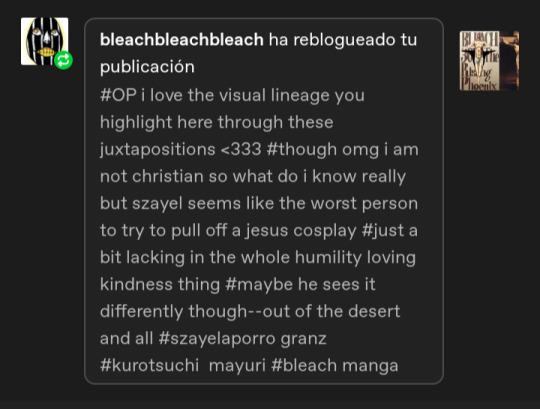
@bleachbleachbleach Omg sorry for tagging you in this but I couldn’t help it. I think Szayelaporro is both the worst and the best to pull off this role!
Interestingly, Kubo gave the main scientists in the story powers that are heavily inspired by religion. I suppose you have read it, but @littleeyesofpallas has already explained how Urahara’s Benihime is related to Kannon, considered the goddess of mercy; and Mayuri’s Ashisogi Jizō is based on the Bodhisattva Jizō, patron deity of children and aborted fetuses.
And just like them, Szayelaporro is heavily related to a religious being (in this case, Christ); and it’s shown in the sexual and biblical themes of his character, which are in themselves closely associated. The Bible made many allusions and references to sex, to the point where saying that something was very "biblical" was a way of saying that it was very sexual/lewd.
The name of his Resurrection is Fornicarás, “you will fornicate”, and the release call is 啜れ, “to slurp, to sip (loudly)”, but clearly is meant to be as in… “to suck”.
He can impregnate the enemy with himself; and the name of the ability, Gabriel, is the name of the Archangel who tells Mary that she will have a child (Jesus). Plus, tradionally, it is said that she was a virgin, and Szayelaporro's victim becomes practically pregnant despite no sexual encounter.
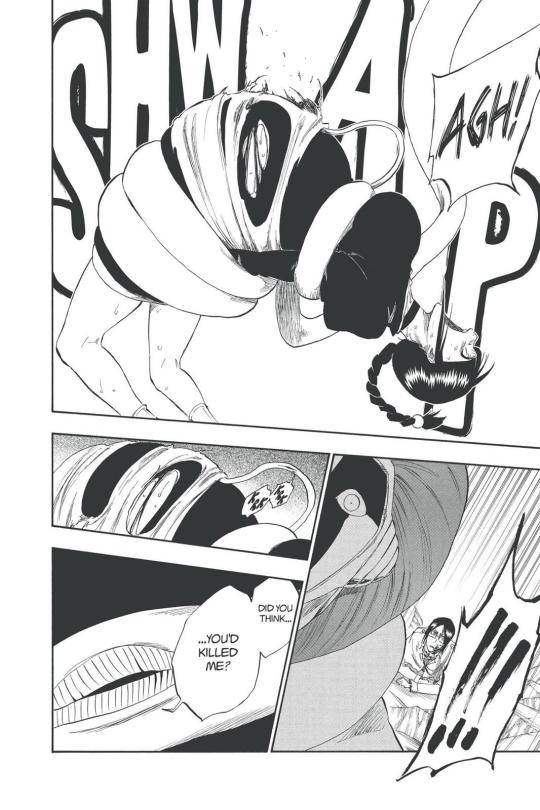
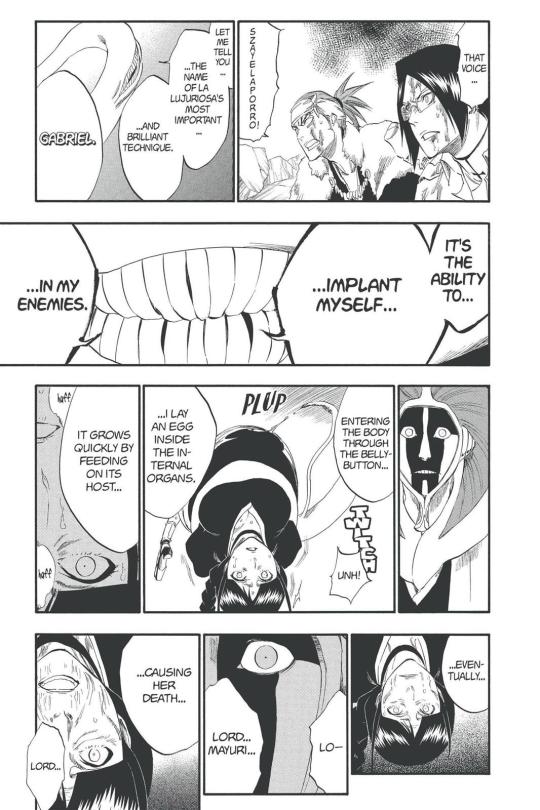
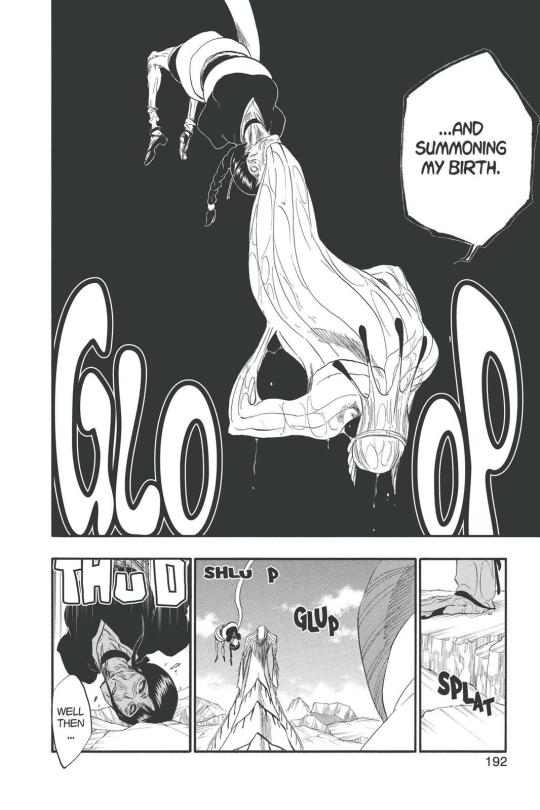
His Hollow hole is located in his glans.
His BBS Beyond resurrection design was, apparently, based on fallopian tubes… ahem, self-penetrating fallopian tubes (though the final design was way more subtle).
Speaking of, his theme song, chosen by Kubo, would be "Rape me" by Nirvana, from the album In Utero.
The Christ on the cross cover: Christ, who would come to be the "perfect being" for believers, and who later resurrects and ascends to heaven (where he says that life is eternal); similar to Szayel who claims to be the perfect being after being reborn from Nemu, and who can do so several times, becoming an eternal being.
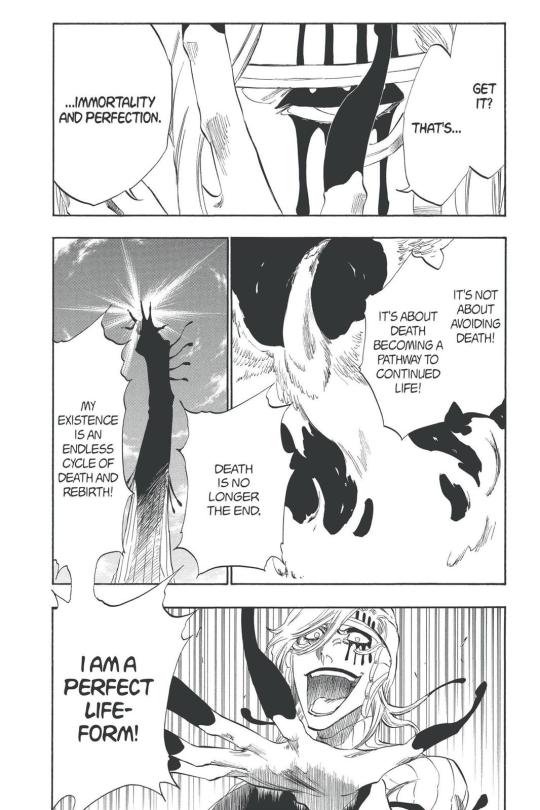
+ the contrast with Mayuri’s cover: The goat head and the letters upside down to reference Baphomet; a deity associated with wisdom and the pursuit of knowledge.

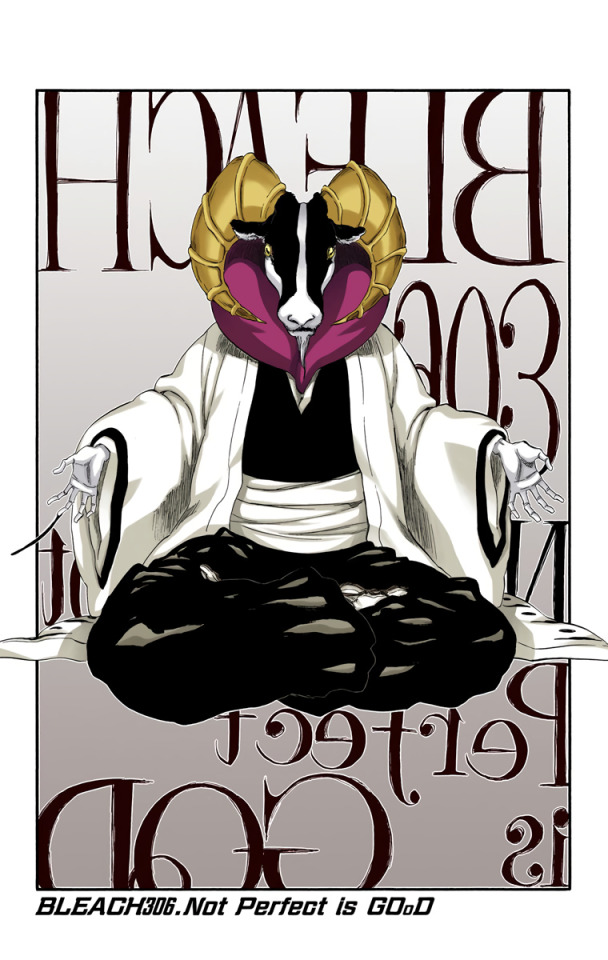
I think Kubo really highlighted the sexual theme while also making sure to keep the biblical aspects clear, similarly to what he did with Urahara & Mayuri: scientist corrupting a deity, twisting them and showing a much more depraved side to them.
I apologize for tagging you guys in my obvious ramblings, I just got excited ;u; But tell me if you want me to remove the tag!
#bleach#szayelaporro granz#ramblings#aaahhh I just could spend hours talking about this guy#but yeah this is probably very old news...
30 notes
·
View notes